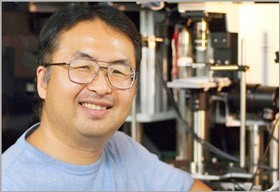13 juillet 2018 à 11h00 (Amphi Broca Nouvelle-Aquitaine / Campus Carreire)
Abstract :
Long-term synaptic plasticity requires a mechanism that converts short Ca2+ pulses into persistent biochemical signaling to support the changes in the function and structure of synapses over long period of time. Here, we present a positive feedback loop, formed by a « reciprocally activating kinase-effector complex » (RAKEC) in dendritic spines, enabling the persistence and confinement of the molecular memory. We found that stimulation of a single spine causes the rapid formation of a RAKEC consists of a kinase CaMKII and its substrate a RacGEF TIAM1, which can stably promote actin-polymerization through Rac1, thereby maintaining the structure of the spine over a long period of time during LTP. This is achieved by a pseudo-autoinhibitory domain found within TIAM1, homologous to the autoinhibitory domain of CaMKII. RAKEC can store biochemical information in small subcellular compartments, thus potentially serving as a general mechanism for the production of prolonged and compartmentalized signaling.


